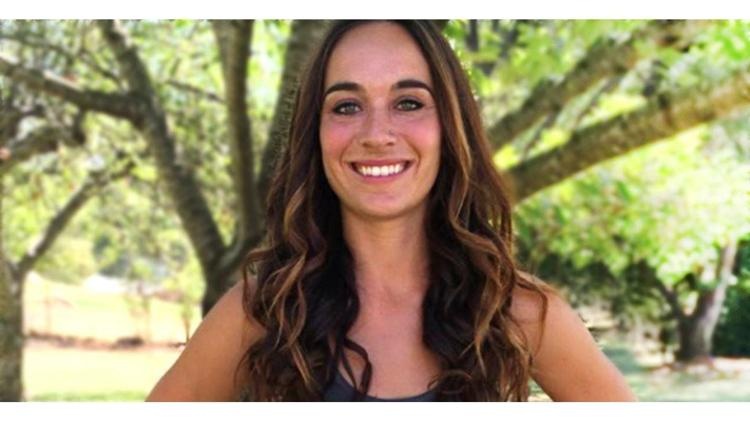
When Ashley Fajardo tested positive for the Huntington’s disease gene at 18 years old, she was devastated but not surprised. Having lost her mother to the rare genetic disorder five years earlier, she knew her odds for having the gene were high.
“It’s a terminal illness so of course I was sad; I was consumed by the results for a while,” said Fajardo. “But with the support of my family and through volunteering with the local chapter of the Huntington’s Disease Society, I began to focus more on living for each day and how I could make an impact.”
An estimated 41,000 Americans are living with Huntington’s disease (HD), a hereditary disorder that causes the progressive breakdown of nerve cells in the brain that causes uncoordinated and uncontrolled movements, cognitive deterioration, and behavioral and psychological issues. The symptoms of HD can affect those suffering in many ways by disrupting relationships, jobs and everyday activities.
“I was 30 years old when I realized I was symptomatic. I was working in a restaurant and my constant foot twitching had worn a hole in my shoes,” said Fajardo. “At first it was hard to adjust because I liked to always be on the go. But I’ve learned to be more careful and aware of how I’m feeling, and to recognize that sometimes I just need to scale back.”
90% of people with HD will develop movement symptoms.
Chorea is the most visible symptom of HD and may appear as unexpected and uncontrolled jerking and twisting body movements. Signs may include the flicking of fingers, flailing of the arms or legs, shrugging of the shoulders, having a grimacing look, or irregular eye movement or blinking. These movements can make it difficult for some to take care of daily activities such as pouring or drinking a beverage, brushing their teeth, bathing and dressing, forming words and speaking, and even swallowing or eating. If patients are having difficulty with these actions, they may want to talk with their doctor about the impact of HD chorea and how to manage it. While there is currently no cure for HD, there are treatments available to help manage the movement symptoms caused by HD chorea.
Stay positive, connected and active.
While she has bad days, Fajardo remains hopeful and committed to helping others by sharing her story. “It’s never easy to talk about what I’m going through, but the love and support I get back from the community is so much bigger,” said Fajardo. Her message for people living with HD:
“I used to be worried about the future, but there’s so much to be hopeful for,” said Fajardo. “I’ve learned to just take a breath and enjoy each day.”
To view original article, click here
“It’s a terminal illness so of course I was sad; I was consumed by the results for a while,” said Fajardo. “But with the support of my family and through volunteering with the local chapter of the Huntington’s Disease Society, I began to focus more on living for each day and how I could make an impact.”
An estimated 41,000 Americans are living with Huntington’s disease (HD), a hereditary disorder that causes the progressive breakdown of nerve cells in the brain that causes uncoordinated and uncontrolled movements, cognitive deterioration, and behavioral and psychological issues. The symptoms of HD can affect those suffering in many ways by disrupting relationships, jobs and everyday activities.
“I was 30 years old when I realized I was symptomatic. I was working in a restaurant and my constant foot twitching had worn a hole in my shoes,” said Fajardo. “At first it was hard to adjust because I liked to always be on the go. But I’ve learned to be more careful and aware of how I’m feeling, and to recognize that sometimes I just need to scale back.”
90% of people with HD will develop movement symptoms.
Chorea is the most visible symptom of HD and may appear as unexpected and uncontrolled jerking and twisting body movements. Signs may include the flicking of fingers, flailing of the arms or legs, shrugging of the shoulders, having a grimacing look, or irregular eye movement or blinking. These movements can make it difficult for some to take care of daily activities such as pouring or drinking a beverage, brushing their teeth, bathing and dressing, forming words and speaking, and even swallowing or eating. If patients are having difficulty with these actions, they may want to talk with their doctor about the impact of HD chorea and how to manage it. While there is currently no cure for HD, there are treatments available to help manage the movement symptoms caused by HD chorea.
Stay positive, connected and active.
While she has bad days, Fajardo remains hopeful and committed to helping others by sharing her story. “It’s never easy to talk about what I’m going through, but the love and support I get back from the community is so much bigger,” said Fajardo. Her message for people living with HD:
- Get connected – no one should deal with HD alone. Tell your friends and family how they can help and take advantage of the information, community and services offered by local and national HD groups.
- Maintain a healthy lifestyle – it’s important to eat healthy and remain active. To exercise safely, be in tune with how you’re feeling, take any added precautions, and scale back when needed.
- Stay positive – it’s easy to dwell on the failures. Instead, celebrate little victories every day.
“I used to be worried about the future, but there’s so much to be hopeful for,” said Fajardo. “I’ve learned to just take a breath and enjoy each day.”
To view original article, click here
